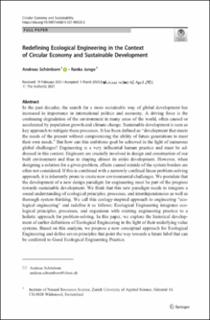Please use this identifier to cite or link to this item:
https://doi.org/10.21256/zhaw-22319Full metadata record
| DC Field | Value | Language |
|---|---|---|
| dc.contributor.author | Schönborn, Andreas | - |
| dc.contributor.author | Junge, Ranka | - |
| dc.date.accessioned | 2021-04-22T09:03:25Z | - |
| dc.date.available | 2021-04-22T09:03:25Z | - |
| dc.date.issued | 2021-04-02 | - |
| dc.identifier.issn | 2730-597X | de_CH |
| dc.identifier.issn | 2730-5988 | de_CH |
| dc.identifier.uri | https://digitalcollection.zhaw.ch/handle/11475/22319 | - |
| dc.description.abstract | In the past decades, the search for a more sustainable way of global development has increased in importance in international politics and economy. A driving force is the continuing degradation of the environment in many areas of the world, often caused or accelerated by population growth and climate change. Sustainable development is seen as key approach to mitigate these processes. It has been defined as “development that meets the needs of the present without compromising the ability of future generations to meet their own needs.” But how can this ambitious goal be achieved in the light of numerous global challenges? Engineering is a very influential human practice and must be addressed in this context. Engineers are crucially involved in design and construction of our built environment and thus in shaping almost its entire development. However, when designing a solution for a given problem, effects caused outside of the system borders are often not considered. If this is combined with a narrowly confined linear problem-solving approach, it is inherently prone to create new environmental challenges. We postulate that the development of a new design paradigm for engineering must be part of the progress towards sustainable development. We think that this new paradigm needs to integrate a sound understanding of ecological principles, processes, and interdependencies as well as thorough system thinking. We call this ecology-inspired approach to engineering “ecological engineering” and redefine it as follows: Ecological Engineering integrates ecological principles, processes, and organisms with existing engineering practice to a holistic approach for problem-solving. In this paper, we explore the historical development of earlier definitions of Ecological Engineering in the light of their underlying value systems. Based on this analysis, we propose a new conceptual approach for Ecological Engineering and define seven principles that point the way towards a future label that can be conferred to Good Ecological Engineering Practice. | de_CH |
| dc.language.iso | en | de_CH |
| dc.publisher | Springer | de_CH |
| dc.relation.ispartof | Circular Economy and Sustainability | de_CH |
| dc.rights | https://creativecommons.org/licenses/by/4.0/ | de_CH |
| dc.subject | Ecological engineering | de_CH |
| dc.subject | Redefinition | de_CH |
| dc.subject | Engineering design | de_CH |
| dc.subject | Circular economy | de_CH |
| dc.subject | Principles | de_CH |
| dc.subject.ddc | 338.927: Umweltökonomie und nachhaltige Entwicklung | de_CH |
| dc.subject.ddc | 620: Ingenieurwesen | de_CH |
| dc.title | Redefining ecological engineering in the context of circular economy and sustainable development | de_CH |
| dc.type | Beitrag in wissenschaftlicher Zeitschrift | de_CH |
| dcterms.type | Text | de_CH |
| zhaw.departement | Life Sciences und Facility Management | de_CH |
| zhaw.organisationalunit | Institut für Umwelt und Natürliche Ressourcen (IUNR) | de_CH |
| dc.identifier.doi | 10.1007/s43615-021-00023-2 | de_CH |
| dc.identifier.doi | 10.21256/zhaw-22319 | - |
| zhaw.funding.eu | No | de_CH |
| zhaw.issue | 1 | de_CH |
| zhaw.originated.zhaw | Yes | de_CH |
| zhaw.pages.end | 394 | de_CH |
| zhaw.pages.start | 375 | de_CH |
| zhaw.publication.status | publishedVersion | de_CH |
| zhaw.volume | 1 | de_CH |
| zhaw.publication.review | Peer review (Publikation) | de_CH |
| zhaw.webfeed | Ökotechnologie | de_CH |
| zhaw.author.additional | No | de_CH |
| zhaw.display.portrait | Yes | de_CH |
| Appears in collections: | Publikationen Life Sciences und Facility Management | |
Files in This Item:
| File | Description | Size | Format | |
|---|---|---|---|---|
| 2021_Schoenborn-Junge_Redefining-ecological-engineering.pdf | 1.06 MB | Adobe PDF |  View/Open |
Show simple item record
Schönborn, A., & Junge, R. (2021). Redefining ecological engineering in the context of circular economy and sustainable development. Circular Economy and Sustainability, 1(1), 375–394. https://doi.org/10.1007/s43615-021-00023-2
Schönborn, A. and Junge, R. (2021) ‘Redefining ecological engineering in the context of circular economy and sustainable development’, Circular Economy and Sustainability, 1(1), pp. 375–394. Available at: https://doi.org/10.1007/s43615-021-00023-2.
A. Schönborn and R. Junge, “Redefining ecological engineering in the context of circular economy and sustainable development,” Circular Economy and Sustainability, vol. 1, no. 1, pp. 375–394, Apr. 2021, doi: 10.1007/s43615-021-00023-2.
SCHÖNBORN, Andreas und Ranka JUNGE, 2021. Redefining ecological engineering in the context of circular economy and sustainable development. Circular Economy and Sustainability. 2 April 2021. Bd. 1, Nr. 1, S. 375–394. DOI 10.1007/s43615-021-00023-2
Schönborn, Andreas, and Ranka Junge. 2021. “Redefining Ecological Engineering in the Context of Circular Economy and Sustainable Development.” Circular Economy and Sustainability 1 (1): 375–94. https://doi.org/10.1007/s43615-021-00023-2.
Schönborn, Andreas, and Ranka Junge. “Redefining Ecological Engineering in the Context of Circular Economy and Sustainable Development.” Circular Economy and Sustainability, vol. 1, no. 1, Apr. 2021, pp. 375–94, https://doi.org/10.1007/s43615-021-00023-2.
Items in DSpace are protected by copyright, with all rights reserved, unless otherwise indicated.